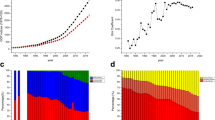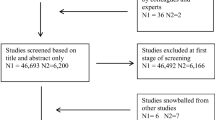Abstract
This article describes the theoretical reasons and empirical operationalization of a multidimensional social origin measure. It is assumed that different parental resources are linked to social inequality through distinct mechanisms. This social origin variable can be used for the analysis of status inconsistencies as well as cumulating and compensating effects of social origin resources on inequality of opportunity. The proposed measure is easy to operationalize and to apply in cross-sectional, longitudinal or cross-national research. A great methodological advantage of the proposed origin measure is that it avoids the problem of multicollinearity that is prevalent in analyses that include various parental resources as separate covariates into a statistical model. To illustrate this social origin measure, we apply it to the field of educational inequality research and use data from the National Educational Panel Study in Germany. However, the approach can be easily generalized to other sociological or economic studies where social inequality is of interest (such as labor market, demographic, political, migration or ethnic research). The illustrative example combines the information of three family resources (parental education, parental class and parental status), but it can be extended to include further family resources such as income or wealth measures.
Similar content being viewed by others
Notes
In this article the term “family” is not restricted to conjugal couples with one or more children. Thus, also non-married couples, single parents with at least one child are seen as a family unit.
References
Baker, D.: The Schooled Society. The Educational Transformation of Global Culture. Stanford University Press, Stanford (2014)
Barone, C., Ruggera, L.: Educational equalization stalled? Trends in inequality of educational opportunity between 1930 and 1980 across 26 European nations. European Societies 20, 1–25 (2018)
Becker, R., Blossfeld, H.-P.: Entry of men into the labour market in West Germany and their career mobility (1945–2008). A long-term longitudional analysis identifying cohort, period, and life-course effects- Journal for Labour Market Research 50, 113 (2017)
Betthäuser, B., Bourne, M.: Harmonizing the measurement of social origin, cognitive ability and educational attainment in four British population surveys: NCDS, BCS70, LSYPE and ALSPAC. SOCED Project Data Note 2016-10-11. (2016)
Blake, J.: Family Size and Achievement. University of California Press, Los Angeles (1989)
Blossfeld, P.N.: Changes in inequality of educational opportunity: The long-term development in Germany. Springer, Wiesbaden (2018)
Blossfeld, H.P., Drobnic, S.: Careers of Couples in Contemporary Society: From Male Breadwinner to Dual-Earner Families. Oxford University Press, Oxford (2001)
Blossfeld, H.-P., von Maurice, J., Schneider, T.: The National Educational Panel Study. In: Blossfeld, H.-P., Roßbach, H.-G., von Maurice, J. (eds.) Education as a Lifelong Process. The German National Educational Panel Study, pp. 5–17. VS Verlag, Wiesbaden (2011a)
Blossfeld, H.-P., Roßbach, H.-G., von Maurice, J.: Education as a lifelong process: The German National Educational Panel Study (NEPS) [Special issue]. Zeitschrift für Erziehungswissenschaft 14, 203 (2011b)
Blossfeld, P.N., Blossfeld, G., Blossfeld, H.-P.: Educational expansion and inequalities in educational opportunity: Long term changes for East and West Germany. Eur. Sociol. Rev. 31, 144–160 (2015)
Bottero, W., Lambert, P.S., Prandy, K., McTaggart, S.: Occupational structures. The stratification of social interactions. In: Robson, K., Sanders, C. (eds.) Quantifying Theory: Pierre Bourdieu. Springer, Wiesbaden (2009)
Boudon, R.: Education, Opportunity, and Social Inequality: Changing Prospects in Western Society. Wiley, New York (1974)
Bourdieu, R.: Distinction: A Social Critique of the Judgement of Taste. Harvard University Press, Cambridge (1984)
Brauns, H., Steinmann, S.: Educational reform in France, West-Germany and the United Kingdom: updating the CASMIN educational classification. Zuma Nachrichten 23, 7–44 (1999)
Breen, R., Luijkx, R., Müller, W., Pollak, R.: Nonpersistent inequality in educational attainment: evidence from eight European Countries. Am. J. Sociol. 114, 1475–1521 (2009)
Buchholz, S., Pratter, M.: Wer profitiert von alternativen Bildungswegen? Alles eine Frage des Blickwinkels! Eine systemaische Rekonstruktion des Effektes sozialer Herkunft für alternative Wege zur Hochschulreife. Kölner Zeitschrift für Soziologie und Sozialpsychologie 69, 409–435 (2017)
Buchholz, S., Schier, A.: New game, new chance? Social inequalities and upgrading secondary school qualifications in West Germany. Eur. Sociol. Rev. 31, 603–615 (2015)
Buis, M.L.: The composition of family background: the influence of the economic and cultural resources of both parents on the offspring’s educational attainment in the Netherlands between 1939 and 1991. Eur. Sociol. Rev. 29, 593–602 (2013)
Buis, M. L.: Combining information from multiple variables using models for causal indicators. (2014). http://www.maartenbuis.nl/wp/prop.pdf. Accessed 21 June 2018
Bukodi, E., Bourne, M., Betthäuser, B.: Wastage of talent? Social origins, cognitive ability and educational attainment in Britain. Adv. Life Course Res. 34, 34–42 (2017)
Bukodi, E., Goldthorpe, J.H.: Decomposing ‘social origins’: The effects of parents’ class, status, and education on the educational attainment of their children. Eur. Sociol. Rev. 29, 1024–1039 (2013)
Bukodi, E., Dex, S., Goldthorpe, J.H.: The conceptualization and measurement of occupational hierarchies: a review, a proposal and some illustrative analyses. Qual. Quant. 45, 623–639 (2011)
Chan, T.W.: Social Status and Cultural Consumption. Cambridge University Press, Cambridge (2010)
Chan, T.W., Goldthorpe, J.H.: Class and status. The conceptual distinction and its empirical relevance. Am. Soc. Rev. 72, 512–532 (2007)
Di Stasio, V., Bol, T., Van de Werfhorst, H.G.: What makes education positional? Institutions, overeducation and the competiton for jobs. Res. Soc. Stratif. Mobil. 43, 53–63 (2016)
Engzell, P.: Intergenerational Persistence and Ethnic Disparities in Education. Dissertation. Stockholm University (2016)
Erikson, R.: Is it enough to be bright? Parental background, cognitive ability and educational attainment. Eur. Soc. 18, 117–135 (2016)
Erikson, R.: Social class of men, women and families. Sociology 18, 500–514 (1984)
Erikson, R., Goldthorpe, J.H.: The Constant Flux: A Study of Class Mobility in Industrial Societies. Oxford University Press, Oxford (1992)
Erikson, R., Goldthorpe, J.H.: Social class, family background, and intergenerational mobility: a comment on Mcintosh and Munk. Eur. Econ. Rev. 53, 118–120 (2009)
Erikson, R., Jonsson, J.O.: Explaining class inequality in education: the Swedish test case. In: Erikson, R., Jonsson, J.O. (eds.) Can Education be Equalized? The Swedish Case in Comparative Perspective, pp. 1–63. Westview Press, Boulder (1996)
Ermisch, J., Francesconi, M.: Family matters: impacts of family background on educational attainments. Economica 68, 137–156 (2001)
Erola, J., Kilpi-Jakonen, E.: Compensation and other forms of accumulation in intergenerational social inequality. In: Erola, J., Kilpi-Jakonen, E. (eds.) Social Inequality Across the Generations. The Role of Compensation and Multiplication in Resource Accumulation, pp. 3–24. Edward Elgar, Cheltenham (2017)
Gambetta, D.: Where They Pushed or Did they Jump? Individual Decision Mechanisms in Education. Westview Press, Boulder (1996)
Goldthorpe, J.H.: Back to class and status: or why a sociological view of social inequality should be reasserted. Rev. Esp. Investig. Soc. 137, 201–216 (2012)
Goldthorpe, J.H.: Analysing social inequality: a critique of two recent contributions from economics and epidemiology. Eur. Sociol. Rev. 26, 731–744 (2010)
Goldthorpe, J.H.: Two oppositions in studies of class: a reflection. In: Lareau, A., Conley, D. (eds.) Social Class. How Does It Work, pp. 350–354. Russell Sage Foundation, New York (2008)
Goldthorpe, J.H.: Social class and the differentiation of employment contracts. In: Goldthorpe, J.H. (ed.) On Sociology. Numbers, Narratives, and the Integration of Research and Theory, pp. 206–229. Oxford University Press, Oxford (2000)
Goldthorpe, J.H.: Class analysis and the reorientation of class theory: the case of persisting differentials in educational attainment. Br. J. Sociol. 47, 481–505 (1996)
Goldthorpe, J.H., McKnight, A.: The economic basis of social class. In: Morgan, S.L., Grusky, D.B., Fields, G.S. (eds.) Mobility and Inequality. Stanford University Press, Stanford (2006)
Goldthorpe, J.H., Hope, K.: Occupational grading and occupational prestige. In: Hope, K. (ed.) The Analysis of Social Mobility. Methods and Approaches, pp. 19–79. Oxford University Press, Oxford (1972)
Hausner, K.-H., Söhnlein, D., Weber, B., Weber, E.: Bessere Chancen mit mehr Bildung. IAB-Kurzbericht No. 11 (2015)
Hillmert, S., Jacob, M.: Social inequality in higher education: Is vocational education a pathway to or away from university? Eur. Sociol. Rev. 19, 319–334 (2003)
Jaeger, M.M.: Educational mobility across three generations: the changing impact of parental social class, economic, cultural and social capital. Eur. Soc. 9, 527–550 (2007)
Lazarsfeld, P.F.: Interchangeability of indices in the measurement of economic influences. J. Appl. Psychol. 23, 33–45 (1939)
Marks, G.N.: Issues in the conceptualisation and measurement of socioeconomic background: do different measures generate different conclusions? Soc. Indic. Res. 104, 225–251 (2011)
Mayer, K.-U., Schnettler, S., Aisenbrey, S.: The process and impacts of educational expansion: Findings from the German Life History Study. In: Hadjar, A., Becker, R. (eds.) Expected and Unexpected Consequences of the Educational Expansion in Europe and the US. Theoretical Approaches and Empirical Findings in Comparative Perspective, pp. 27–47. Haupt Verlag, Bern (2009)
Mayer, K.-U.: Statushierarchie und Heiratsmarkt. University of Mannheim, Habilitation (1977)
Meraviglia, C., Buis, M.L.: Class, status, and education: the influence of parental resources on IEO in Europe, 1893–1987. Int. Rev. Soc. Res. 5, 35–60 (2015)
Minello, A., Blossfeld, H.-P.: From mother to daughter: changes in intergenerational educational and occupational mobility in Germany. Int. Stud. Sociol. Educ. 24, 65–84 (2014)
Müller, W.: Klassenlagen und soziale Lagen in der Bundesrepublik. In: Handl, J., Mayer, K.-U., Müller, W. (eds.) Klassenlagen und Sozialstruktur, pp. 21–100. Campus, Frankfurt am Main (1977)
Müller, W., Pollak, R.: Weshalb gibt es so wenige Arbeiterkinder in Deutschlands Universitäten? In: Becker, R., Lauterbach, W. (eds.) Bildung als Privileg. Erklärungen und Befunde zu den Ursachen der Bildungsungleichheit., pp. 305–341. VS Verlag für Sozialwissenschaften, Wiesbaden (2010)
Müller, W., Shavit, Y.: The institutional embeddedness of the stratification process. A comparative study of qualifications and occupations in thirteen countries. In: Shavit, Y., Müller, W. (eds.) From School to Work: A Comparative Study of Educational Qualifications and Occupational Destinations, pp. 1–48. Clarendon Press, Oxford (1998)
Müller, W., Haun, D.: Bildungsungleichheit im sozialen Wandel. KZfSS Kölner Zeitschrift Für Soziologie Und Sozialpsychologie 46, 1–42 (1994)
Müller, W., Steinmann, S., Schneider, R.: Bildung in Europa. In: Hradil, S., Immerfall, S. (eds.) Die westeuropäischen Gesellschaften im Vergleich, pp. 177–245. Leske + Budrich, Opladen (1997)
Müller, N., Pforr, K., Hochman, O.: The effect of parental wealth on children’s educational decisions in Germany: compensation or demotivation? Open science framework. www.osf.io/vrfsd/ (2017)
Pfeffer, F.T.: Persistent inequality in educational attainment and its Institutional context. Eur. Sociol. Rev. 24, 543–565 (2008)
Prandy, K., Lambert, P.: Marriage, social distance and the social space: an alternative derivation and validation of the Cambridge Scale. Sociology 37, 397–411 (2003)
Reimer, D., Schindler, S.: Soziale Ungleichheit und differenzierte Ausbildungsentscheidungen beim Übergang zur Hochschule. In: Becker, B., Reimer, D. (eds.) Vom Kindergarten bis zur Hochschule. Die Generierung von ethnischen und sozialen Disparitäten in der Bildungsbiographie, pp. 251–283. Vs Verlag für Sozialwissenschaften, Wiesbaden (2010)
Roth, T.: Interpersonal influences on educaitonal expectations: New evidence for Germany. Res. Soc. Stratif. Mobil. 48, 68–84 (2017)
Saar, E., Helemäe, J.: The role of economic and cultural resources in the intergenerational transmission of education in Estonia. In: Erola, J., Kilpi-Jakonen, E. (eds.) Social Inequality Across the Generations. The Role of Compensation and Multiplication in Resource Accumulation, pp. 27–47. Edward Elgar, Cheltenham (2017)
Schimpl-Neimanns, B.: Soziale Herkunft und Bildungsbeteiligung. KZfSS Kölner Zeitschrift Für Soziologie Und Sozialpsychologie 52, 636–669 (2000)
Schmillen, A., Stüber, H.: Bildung lohnt sich ein Leben lang. IAB-Kurzbericht No. 1 (2014)
Shavit, Y., Park, H.: Introduction to the special issue: education as a positional good. Rese. Soc. Stratif. Mobil. 43, 1–3 (2016)
Sorensen, A.: Women, family and class. Ann. Rev. Sociol. 20, 27–45 (1994)
Von Maurice, J., Blossfeld, H.-P., Roßbach, H.-G.: The National Educational Panel Study: Milestones of the Years 2006–2015. In: Blossfeld, H.-P., von Maurice, J., Bayer, M., Skopek, J. (eds.) Methodological Issues of Longitudinal Surveys, pp. 3–18. Springer Fachmedien, Wiesbaden (2016)
Weber, M.: Wirtschaft ud Gesellschaft. J. C. B. Mohr, Tübingen (1976)
Wippler, R.: Kulturelle Ressourcen, gesellschaftlicher Erfolg und Lebensqualität. In: Giesen, B., Haferkamp, H. (eds.) Soziologie der sozialen Ungleichheit, pp. 221–254. VS Verlag für Sozialwissenschaften, Wiesbaden (1987)
Wright, E.O.: Women in the class structure. Polit. Soc. 17, 35–66 (1989)
Acknowledgements
Funding was provided by the German National Academic Foundation.
Author information
Authors and Affiliations
Corresponding author
Rights and permissions
About this article
Cite this article
Blossfeld, P.N. A multidimensional measure of social origin: theoretical perspectives, operationalization and empirical application in the field of educational inequality research. Qual Quant 53, 1347–1367 (2019). https://doi.org/10.1007/s11135-018-0818-2
Published:
Issue Date:
DOI: https://doi.org/10.1007/s11135-018-0818-2




